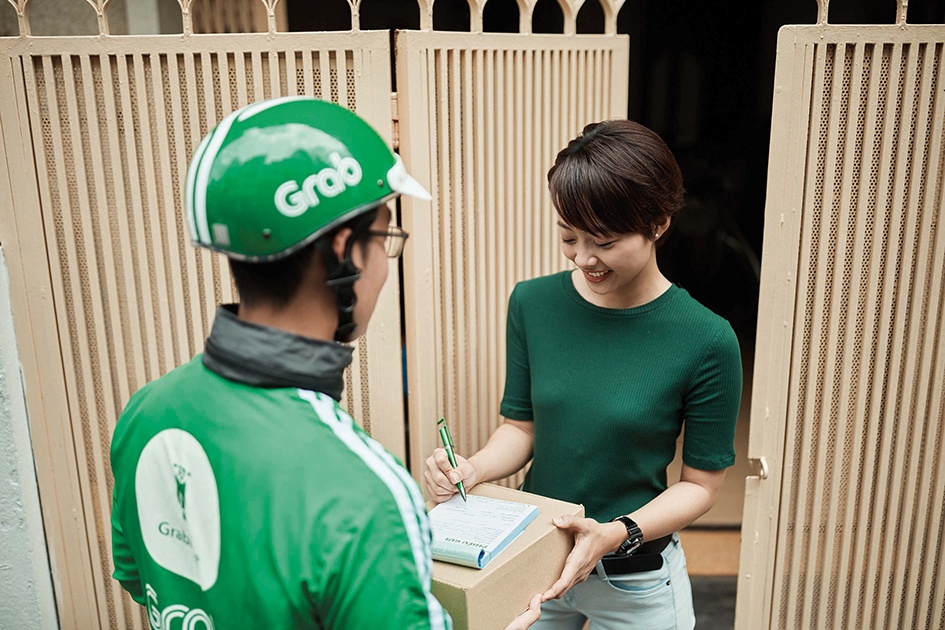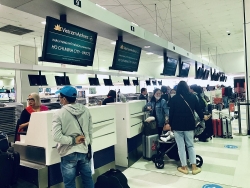
Grab's leader 'unlock' ways to adapt to a Post-COVID-19 world
Latest
| TIN LIÊN QUAN | |
| HCM City gets ready for new foreign investment wave post-COVID-19 | |
| Vietnamese music video "Viet Nam oi! Danh Bay COVID" makes foreign headlines | |
 |
In 2014, Grab started in Vietnam as part of our mission to drive Southeast Asia forward through technology. Since then, thanks to the Vietnamese government’s support, we have been able to play a positive role in propelling Vietnam towards Industrial Revolution 4.0 and serve the country’s most important everyday essential needs. As an integrated tech platform, our range of services in Vietnam currently include e-hailing transport - GrabTaxi, GrabCar, GrabBike; logistics services - GrabExpress; food delivery - GrabFood; cloud kitchen - GrabKitchen; online groceries - GrabMart; as well as financial services and cashless payment via Moca, our strategic partner.
But COVID-19 has left a trail of disruption. Like many other businesses, Grab has also not been spared. The pandemic has altered the way we live and transforming business models and consumer behaviors.
The world is starting to emerge from hopefully the worst of the pandemic. If the past few months have been a frantic attempt to contain the virus, the coming period presents an opportunity to rebuild and reshape societies for the better. As enticing as it may be to go back to life before COVID-19, the world before also had its share of problems such as income disparity and a growing digital divide. This is a rare opportunity to find more sustainable ways to cope with future pandemics, as well as to strengthen social and economic models across Southeast Asia.
Catalyst for innovation
COVID-19 might be the impetus governments need to deeply drive innovation. Many sectors that have for the longest time stubbornly resisted going digital are now compelled to digitalize to survive. Governments and businesses are now more open to experimenting and embracing technology to solve problems.
The priority now is to build on this momentum. Many of the current digitalization efforts touch on obvious pain points such as the use of e-payment systems and setting up an online presence in lieu of physical stores. But digitalization needs to be much more pervasive. Businesses need to rethink their fundamental business models from back-end business process automation to using insights from data to improve their product proposition.
This is where governments and tech companies play an important role. Beyond encouraging businesses to take the initial leap in their digitalization journey, it is important to open them up to the full potential of digital transformation. In Vietnam, the government is doing that exactly. With the emphasis on Industrial Revolution 4.0, Vietnam has been pushing for wider digital adoption and helping businesses thrive in a digital world. To realize this vision, tech platforms such as Grab have been working hand-in-hand with the government. For example, we have helped accelerate the digitalization of small and traditional businesses, as well as empower micro-entrepreneurs, thus improving the livelihoods of millions of Vietnamese.
Now is the time for governments to push hard on this, whether it is steering businesses towards wider digital adoption or building a conducive tech ecosystem to support businesses digitalize for the longer term.
Looking ahead, sectors that have been most affected by COVID-19 will be most ripe for radical innovation. In healthcare, there is scope for greater automation and the use of robotics in the medical sector. Digital solutions such as telemedicine will be useful in situations where the patient must practice physical distancing or is unable to attend a healthcare facility in person.
In the logistics industry, digitalization and advanced analytics can optimize operations and restart disrupted supply chains. The public sector also needs to keep up with digitalization trends. On 3 June 2020, Vietnam’s Prime Minister Nguyen Xuan Phuc approved the National Digital Transformation Programme, which strives to completely revamp Government operations and stimulate a digital economy by 2030. Many of Vietnam’s swift and effective public health responses have been enabled by information technology. The country has effectively employed the high penetration of mobile phones (150%) and the Internet (70%) amongst the population. Alert notifications and reminders from health authorities to take precautionary measures are regularly circulated via text messages, websites and social media. With greater digitalization of public services, Vietnam can better prepare for future pandemics.
Building the future of work
COVID-19 has highlighted how gig work is critical. In Southeast Asia, many governments classified online delivery as an essential service. During lockdowns, people who are not able to commute depending on delivery services to meet their daily needs. With a greater emphasis on health and safety, we have seen innovative measures such as contactless deliveries. We also saw a shift in social behavior with customers showing their appreciation for gig work in the form of increased tipping and tip size across the region.
However, this period has also highlighted how gig workers can be vulnerable. Given the drop in ride-hailing volumes, many of our driver-partners fear to lose their livelihoods more than the virus itself. But the way forward is not to force traditional employment models into the gig economy. This will only negate the benefits in terms of flexibility that gig work brings.
It is crucial for governments, platforms, and technology companies to come together to see how gig workers can be better supported in the “new normal”. In the short term, platforms like Grab are doing what we can to support our partners during this difficult period such as providing a financial assistance package that pays a lump sum to driver-partners stricken with COVID-19.
But longer-term solutions are needed to ensure the concerns of gig workers are sufficiently addressed. The first step is to better understand their needs because gig workers are not a homogeneous group – some are only doing it temporarily, while others depend on gig work for income.
We can then work towards practical solutions that address issues such as social protection and access to finance for different types of gig workers. All this while also balancing the needs of consumers and the sustainability of platform businesses that enable the gig economy. This will require innovation, policy adjustments and close collaboration across the public and private sectors.”
Trade and collaboration – not isolation
COVID-19 has caused an unprecedented global standstill. Governments across the world have imposed movement restrictions, preventing non-residents from entering and even stopping their own citizens from traveling overseas. Amidst supply chain disruptions, the WTO predicted that world trade in 2020 will fall by between 13% and 32%.
While countries have understandably looked inwards to contain the pandemic, it is important to ensure that this is only temporary. The solution to COVID-19 is not to close off from the rest of the world, but to maintain strong collaboration amongst countries. Openness to foreign investment, cross-border data flows and digitalization has allowed people and economies to remain connected despite border closures. As countries prepare to reopen, governments and tech companies need to continue finding ways to enhance cross-border digitalization efforts.
Brave new collaborative world
Embracing a digital-first approach is critical to navigating future uncertainties. The journey will not be easy and there will be risks, but we need to come together. Many issues cannot be solved without collaboration and we will need to institutionalize closer dialogue among public and private sectors.
It is imperative to rethink how governments and businesses can better work together to prepare for when the next pandemic strikes. Platform companies like Grab offer the technology, agility and wide network that can help support governments maintain a strong digital culture. Our platform, which enables other businesses to embrace technology and grow in a digital world, has brought immense benefits to Vietnam. But we recognize that more can still be achieved. The “new normal” will need to focus on practical public-private collaborations to serve the greater community as we work towards rebuilding post-COVID-19.

| Mekong Delta firms see new orders down 80.7 percent due to COVID-19 pandemic The COVID-19 pandemic has seriously affected businesses in the Mekong Delta region, with the number of new orders down 80.7 percent year-on-year. |

| More than 300 Vietnamese citizens brought home from Malaysia Some 310 Vietnamese citizens were brought home from Malaysia on July 5. |

| COVID-19: Over 350 Vietnamese citizens repatriated from Australia, New Zealand More than 350 Vietnamese citizens from Australia and New Zealand were brought home safe and sound on July 3. |

















